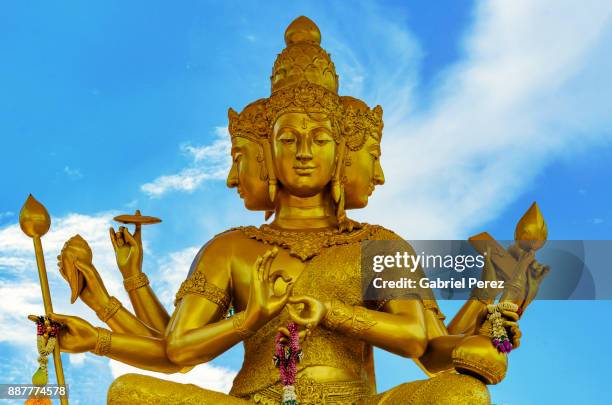In the rich tapestry of Hindu mythology and tradition, numerous gods and goddesses are revered and worshipped. However, there is one prominent deity who remains largely absent from the prayers and rituals of devotees - Brahma, the creator of the universe. While Brahma holds a significant position in Hindu cosmology, the reasons behind his limited worship are multifaceted and often tied to the intricate narratives within Hindu mythology.
Reasons Why Brahma is Not Worshipped
The Primordial Creator
In Hinduism, Brahma is considered the creator of the universe, responsible for bringing forth life and existence. However, as the cosmic engineer, his role is considered to be complete once he has set the wheels of creation in motion. Unlike Vishnu, the preserver, or Shiva, the destroyer, Brahma is seen as having fulfilled his purpose and subsequently assumes a less prominent role. Consequently, the focus of devotion tends to shift towards the gods who play active roles in the preservation and protection of the world.
Mythological Accounts
The dearth of Brahma worship can also be attributed to certain mythological accounts that have shaped Hindu religious practices. One such tale involves a competition between Brahma and Vishnu, who sought to determine who was the supreme deity. In this contest, Vishnu assumed the form of a boar and descended into the depths of the universe, while Brahma took the shape of a swan and attempted to reach the pinnacle. While Vishnu successfully completed his task, Brahma resorted to dishonesty by claiming he had seen the top. As a result, Shiva, the ultimate arbitrator, punished Brahma by limiting his worship. This narrative may have contributed to the diminished significance of Brahma in Hindu worship.
Lack of Temples and Iconography
Another reason for the lack of widespread worship of Brahma lies in the scarcity of temples dedicated exclusively to him. Unlike Vishnu and Shiva, who have numerous temples across India, Brahma temples are few and far between. The most renowned temple dedicated to Brahma is the Brahma Temple in Pushkar, Rajasthan, which holds great significance. However, this temple stands as an exception rather than the rule. The lack of widespread temple infrastructure dedicated to Brahma limits opportunities for devotees to engage in worship.
Philosophical Perspectives
From a philosophical standpoint, Brahma is often viewed as the transcendent and formless reality underlying all existence. As such, devotees may choose to focus their reverence on the abstract concepts and manifestations of divinity, such as Brahman or the Trimurti (the trinity of Brahma, Vishnu, and Shiva). By directing their devotion to these broader concepts, individuals can cultivate a deeper understanding of the interconnectedness of the universe, transcending the need for a specific deity.
Conclusion
The limited worship of Brahma within Hinduism can be attributed to a combination of factors, including his role as the primordial creator, mythological accounts, lack of temples, and philosophical perspectives. While Brahma's significance within Hindu theology remains intact, his worship has been overshadowed by the active roles and narratives associated with other deities. Nevertheless, understanding the nuanced reasons behind the absence of Brahma worship enriches our comprehension of the vast and intricate tapestry of Hindu mythology and the diverse ways in which divinity is experienced and revered.
Q1: Why are there no Brahma Temples?
The scarcity of Brahma temples can be attributed to several factors. Firstly, Brahma is considered to have fulfilled his primary role as the creator of the universe, and his prominence diminishes in comparison to gods like Vishnu and Shiva, who have active roles in preserving and protecting the world. Consequently, there may be less demand for dedicated temples to Brahma.
Additionally, Hindu mythology includes narratives that may have influenced the lack of dedicated Brahma temples. For example, the tale of Brahma's dishonesty in claiming to have seen the pinnacle of the universe resulted in his punishment and limited worship. This narrative may have dissuaded the establishment of widespread temple infrastructure dedicated solely to Brahma.
However, it is worth noting that there is at least one renowned Brahma temple in Pushkar, Rajasthan, called the Brahma Temple. While it stands as an exception, the scarcity of Brahma temples persists.
Q2: What religion believes in the god Brahma?
Brahma is primarily worshipped in Hinduism. Hinduism is an ancient religion with a rich and diverse collection of beliefs and practices. It encompasses a wide range of gods and goddesses, with Brahma being one of the key deities in Hindu cosmology. Hinduism embraces the concept of multiple deities, representing different aspects of divinity and cosmic forces. Brahma holds the role of the creator within this pantheon.
Q3: Is Brahma really a god?
Yes, Brahma is considered a god in Hinduism. He is regarded as the creator of the universe and plays a vital role in the Hindu cosmological framework. While Brahma holds a significant position in Hindu mythology, his worship is relatively limited compared to other gods in the pantheon, such as Vishnu and Shiva.
Q4: Why is Indra not worshipped?
The decrease in the worship of Indra, the god of thunder and rain in Hinduism, can be attributed to various factors. In ancient times, Indra held a more prominent position and was worshipped widely. However, as Hinduism evolved, the focus shifted to other deities, particularly Vishnu and Shiva, who gained greater popularity.
Additionally, there are mythological accounts in Hindu scriptures that portray Indra as prone to human flaws, such as arrogance and indulgence. These stories may have influenced the diminishing worship of Indra, as devotees sought deities embodying more virtuous qualities.
Furthermore, Hindu philosophy often emphasizes the idea of a supreme divine reality beyond individual gods and goddesses. Devotees may choose to worship the abstract concepts and manifestations of divinity rather than specific deities like Indra.
Overall, the decrease in the worship of Indra can be attributed to a combination of shifting religious practices, mythological narratives, and philosophical perspectives within Hinduism.








No comments:
Post a Comment